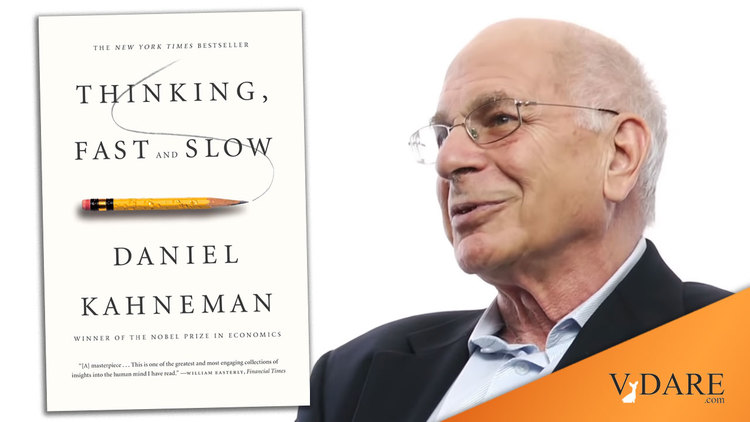
02/27/2021
From The New York Times sports section:
This Book Is Not About Baseball. But Baseball Teams Swear by It.
A psychology book by a Nobel Prize-winning author has become a must-read in front offices. It is changing the sport.
“Thinking, Fast and Slow” has nothing — and everything — to do with baseball.
By Joe Lemire
Feb. 24, 2021… [Daniel] Kahneman, a professor emeritus at Princeton University and a winner of the Nobel Prize in economics in 2002, later wrote “Thinking, Fast and Slow,” a book that has become essential among many of baseball’s front offices and coaching staffs.
There aren’t many explicit references to baseball in “Thinking, Fast and Slow,” yet many executives swear by it. It has circulated heavily in the front offices of the Oakland Athletics, the Los Angeles Dodgers, the Baltimore Orioles and the Astros, among others. …
Andrew Friedman, the president of baseball operations for the Dodgers, recently cited the book as having “a real profound impact,” and said he reflects back on it when evaluating organizational processes.
I reviewed Kahneman’s bestseller in 2012.
Thinking, Fast and Slow’s basic idea is helpful, if not terribly startling: Acts of human cognition can be pictured as falling along a continuum from intuition (which is fast and fun) to logic (which is slow and tiring). Snap judgments work well enough much of the time, especially by avoiding paralysis through analysis. Not surprisingly, fast thinking is susceptible to various shortcomings, as Kahneman has shown over the decades via countless experiments of the kind in which psychology majors pick up a spare ten bucks.
If Kahneman’s basic finding — you can fool a lot of the people a lot of the time — wasn’t so obvious already to those who aren’t economists, a reader might sometimes wonder about his methodology.
My objection to Thinking, Fast and Slow is that it seldom starts from actual real-world examples of mistaken thinking. Instead, it starts out from extremely contrived brain-teasers that were designed to fool you into giving the wrong answer, such as the famous “Linda is a bank teller” one where Tversky and Kahneman fool the public by severely violating the Chekhov’s Gun principle of good storytelling.
Then in 2017, I reviewed Michael Moneyball Lewis’s biography of Kahneman and his late partner Amos Tversky, two Israeli IQ scientists, The Undoing Project, and pointed out more of why I’m less wowed than most by Thinking, Fast and Slow:
Now, this may sound to you and me like a debate over whether the glass is part full or part empty, but Kahneman’s intellect is more powerful than supple.
For example, here’s one of Kahneman’s first brain twisters:
The mean I.Q. of the population of eighth-graders in a city is known to be 100. You have selected a random sample of 50 children for a study of educational achievement. The first child tested has an I.Q. of 150. What do you expect the mean I.Q. to be for the whole sample?
An I.Q. of 150 is quite rare: It should occur randomly only once out of every 2,330 people. So in this case you might well wonder whether the sample is really “random” or just how confidently it is “known” that the mean is 100.
After all, the United States military severely screwed up the scoring of their I.Q.-like AFQT enlistment test from 1976 to 1980. Senator Sam Nunn kept asking the Pentagon why sergeants were complaining to him that the military was suddenly letting in some real dumb-asses.
The brass, however, scoffed at Nunn’s lowly informants. Obviously, the sergeants were irrationally biased. What could drill instructors possibly know about psychometrics?
But after several years of denial, the Pentagon suddenly announced that their psychologists had accidentally inflated the test’s scoring.
Yet, according to Kahneman, it is irrational for you to worry about real-world concerns like these. He has stipulated that the sample is random and the mean is 100, so that’s all you need to know.
Hence, the rational answer is 101 and no other responses are acceptable. …
I’m a lot more skeptical of IQ testing than Kahneman is.
For example, it never seems to have occurred to Lewis that Oakland A’s baseball general manager Billy Beane might not have drawn back the curtain on his statistical techniques for the benefit of Lewis’s Moneyball purely out of a disinterested love of advancing learning. …
Moneyball diverted attention to obscure Oakland fringe players and away from Beane employing in 2002 a slugging shortstop, Miguel Tejada, who won the Most Valuable Player award by driving in a remarkable 131 runs.
And then, two years later, Tejada knocked in 150 runs.
A shortstop with 150 RBIs is about as plausible as a randomly chosen child with a 150 I.Q.
(See? There was a reason I put in those details.) …
In 2009, Tejada pleaded guilty to perjuring himself to Congress regarding steroids.
But, seriously, would there be a market for a less Aspergery book that starts with real-world mistakes that people commonly make? Or is Kahneman’s extremely nerdish way of thinking part of the appeal? Do nerds love reading about how the super-nerd tricks the normies into revealing how stupid they are?
[Comment at Unz.com]This is a content archive of VDARE.com, which Letitia James forced off of the Internet using lawfare.